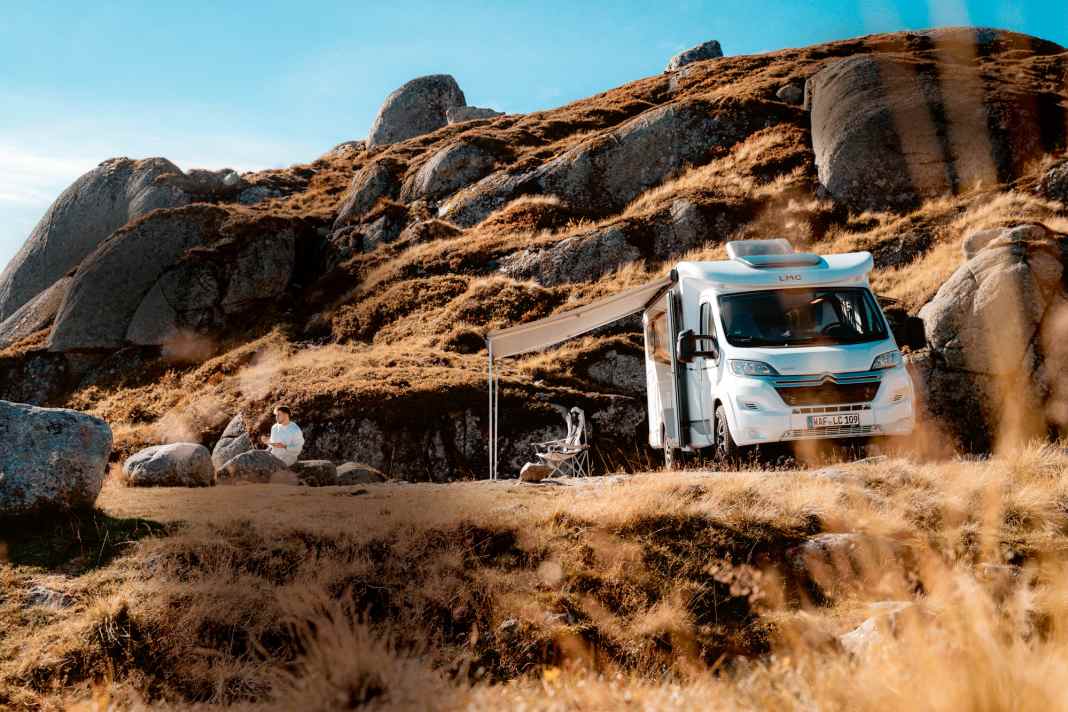- 1. the journey is the destination
- 2 Other countries, other customs
- 3. camper pick-up - what you need to bear in mind at handover
- 4. the correct loading of the motorhome
- 5. stow two-wheelers correctly
- 6. the first journey with the motorhome
- 7. finally here!
- 8. camping etiquette: etiquette on the campsite
- 9. watch out for theft: how to secure your campervan
- 10. the perfect end to your holiday
1. the journey is the destination
Driving distances that are far too long, a poorly planned route and, as the cherry on the cake, you end up standing in front of a fully booked campsite after hours of arduous driving. These are classic mistakes made by novice campers. It is important that your first camping trip never goes too far away. It's not for nothing that more than half of German campers choose their home country as their destination. For the perfect camping trip, the journey is the destination. If you decide against standard routes when planning your trip, you can enjoy the view during the journey - and avoid the odd traffic jam. With children as passengers, you should take a break after about three hours and plan daily stages that do not exceed 200 kilometres, says camping professional Daniel Schmidt from LMC.
Further camping topics:
2 Other countries, other customs
If you are travelling further afield, it is important to find out about road traffic regulations and toll laws abroad. For example, new drivers in Italy are only allowed to drive at 90 km/h on country roads and 100 km/h on motorways for the first three years after obtaining their driving licence. In contrast, adults should not exceed 130 km/h on the Italian motorway in motorhomes weighing less than 3.5 tonnes. You should also keep an eye on the toll regulations. Almost all motorways, some passes and tunnels are subject to tolls. These are just some of the special features in Italy. It is important to be well informed, as high fines can tear a hole in your travelling budget.
3. camper pick-up - what you need to bear in mind at handover
The best way to familiarise yourself with campervan life is to rent the vehicle of your choice for your first trip. According to a recent ADAC survey, most Germans opt for a motorhome - closely followed by a camper van - but experts recommend analysing your own needs when choosing accommodation. How many people am I travelling with? How much comfort is important to me and what budget do I have available? When handing over the campervan to the hire company, one thing is important: take your time. It's better not to take the kids along to this event, because the briefing is the be-all and end-all. "You should definitely check the vehicle for previous damage on site, ideally with two people, and note this on a handover report," says Daniel Schmidt. Videos can also help. Most manufacturers now have tutorials online, so you will definitely be able to handle the toilet cassette, power supply and gas cylinder correctly.
4. the correct loading of the motorhome
A simple rule is: the load in the camper should be stowed as low as possible between the axles and properly secured before setting off to avoid major damage. What helps is a packing list with the most essential items, as new campers tend to pack far too much. However, the maximum total weight of the camper is relevant. It can be found in Part 1 of the registration certificate. Campers should therefore take out a calculator: Total mass minus unladen weight equals the payload. If this is exceeded, it can be expensive - especially abroad. Don't forget: Bicycles or e-bikes must also be included in the calculation. LMC Marketing Manager Daniel Schmidt advises - in return for a small donation to the coffee box - to go to waste disposal companies or agricultural dealers around the corner to weigh the vehicle.
5. stow two-wheelers correctly
More and more campers are taking their bikes with them and no longer want to do without them. Depending on the type of motorhome, there are different options for storing two-wheelers. Some vehicles have a rear garage. This has two major advantages: The bikes cannot be stolen and they are clean and ready to go after the journey. If you want to transport motorised two-wheelers or several bikes, it is advisable to use bike racks for mounting on the chassis or on the rear wall. If you need to transport the bike inside the vehicle, there are transportable floor mounts. For safety, always attach them to the side walls with drawstrings. If you are hiring a campervan, you need to clarify in advance what options are available for transporting the bike.
6. the first journey with the motorhome
Before you set off in your campervan for the first time or in general, you should check: Is the load secured? Are all windows closed, including the roof hatch? Is the shore power connection disconnected and the lights inside switched off? To avoid unnecessary energy consumption, the 12V supply should also be switched off. You can save fuel by keeping up with the traffic and not always travelling in the fast lane. You should also not underestimate the size of the rented campervan. Side mirrors etc. are often hit because the width or height of the vehicle is not correctly estimated. This can be prevented by travelling a short test route before the first long journey.
7. finally here!
Once you have finally arrived at the campsite of your choice and registered at reception, the first thing to do is to take the camper to the final and supply points. Fill up the fresh water tank here. Then it's time to park in the pitch: it's best to orientate yourself to your fellow campers. If you like, or if the space makes it necessary, you can align the camper with plastic or wooden wedges.
8. camping etiquette: etiquette on the campsite
There are a few unwritten rules that you should follow on the campsite. These include: Always drive at walking pace, keep dogs on a lead and respect the privacy of other guests. Therefore, you should not walk across other people's pitches and take the respective customs into account when positioning your camper. The camper's waste water should only be emptied in the designated stations and rubbish must always be disposed of properly. And never - absolutely never - use the fresh water hose to flush out the toilet canister.
9. watch out for theft: how to secure your campervan
All holidaymakers want to have a carefree time camping. If you keep a few things in mind, safety is also guaranteed when holidaying on four wheels. In general - as with other holidays - it is best to leave jewellery and valuables at home. Always have emergency numbers to hand. Money should be carried on your person if possible. Always lock the car and only stay overnight at designated campsites. Never spend the night in the car at motorway service areas. It is also advisable for beginners not to camp in the wild. However, Daniel Schmidt confirms that camping is one of the safest types of holiday, especially in Germany, and that crime on campsites is very low. If you still want to protect yourself, you can help with steering wheel claws, additional locks or an alarm system.
10. the perfect end to your holiday
"Give yourself enough time for the return journey. Nothing is worse than arriving home at the last minute and having to unpack the rented vehicle at night because it has to be back at the hire company the next morning. It's therefore better to plan an extra day for this," says the professional. However, as soon as the journey home or onwards is due, it is important to return the campervan to its original driving condition. Put the seats in the driving position, empty the waste water and toilet and dispose of the rubbish. If you are standing on muddy ground, you sometimes need external help to pull the vehicle out of the pitch. This is best announced to the groundsman the day before.
This article is part of the 2024 camping special by surf, bike and MyBike







